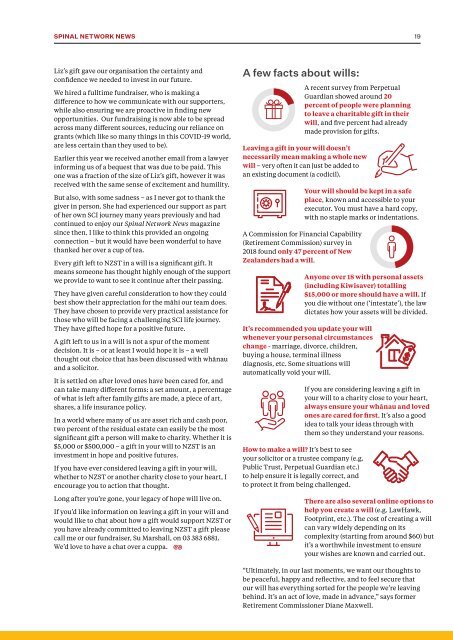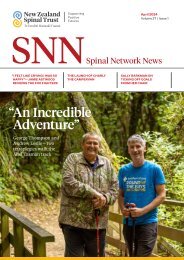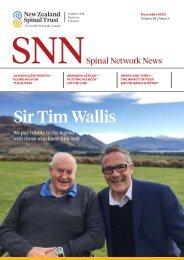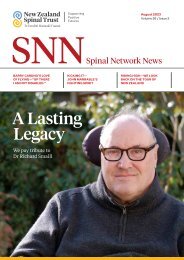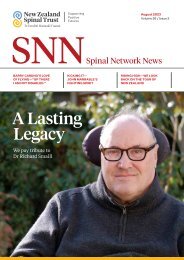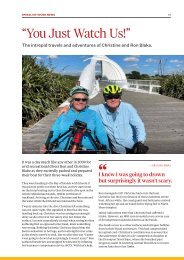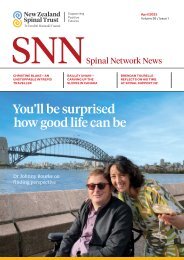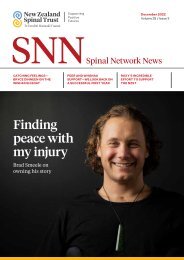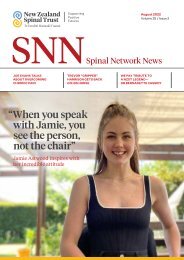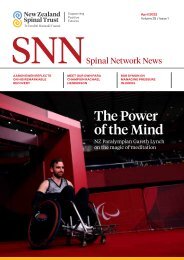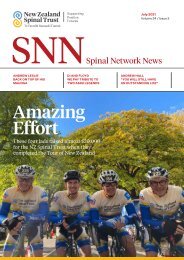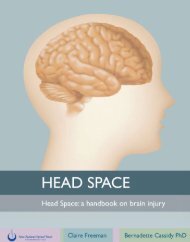Create successful ePaper yourself
Turn your PDF publications into a flip-book with our unique Google optimized e-Paper software.
SPINAL NETWORK NEWS 19<br />
Liz’s gift gave our organisation the certainty and<br />
confidence we needed to invest in our future.<br />
We hired a fulltime fundraiser, who is making a<br />
difference to how we communicate with our supporters,<br />
while also ensuring we are proactive in finding new<br />
opportunities. Our fundraising is now able to be spread<br />
across many different sources, reducing our reliance on<br />
grants (which like so many things in this COVID-19 world,<br />
are less certain than they used to be).<br />
Earlier this year we received another email from a lawyer<br />
informing us of a bequest that was due to be paid. This<br />
one was a fraction of the size of Liz’s gift, however it was<br />
received with the same sense of excitement and humility.<br />
But also, with some sadness – as I never got to thank the<br />
giver in person. She had experienced our support as part<br />
of her own SCI journey many years previously and had<br />
continued to enjoy our Spinal Network News magazine<br />
since then. I like to think this provided an ongoing<br />
connection – but it would have been wonderful to have<br />
thanked her over a cup of tea.<br />
Every gift left to NZST in a will is a significant gift. It<br />
means someone has thought highly enough of the support<br />
we provide to want to see it continue after their passing.<br />
They have given careful consideration to how they could<br />
best show their appreciation for the māhi our team does.<br />
They have chosen to provide very practical assistance for<br />
those who will be facing a challenging SCI life journey.<br />
They have gifted hope for a positive future.<br />
A gift left to us in a will is not a spur of the moment<br />
decision. It is – or at least I would hope it is – a well<br />
thought out choice that has been discussed with whānau<br />
and a solicitor.<br />
It is settled on after loved ones have been cared for, and<br />
can take many different forms: a set amount, a percentage<br />
of what is left after family gifts are made, a piece of art,<br />
sha<strong>res</strong>, a life insurance policy.<br />
In a world where many of us are asset rich and cash poor,<br />
two percent of the <strong>res</strong>idual estate can easily be the most<br />
significant gift a person will make to charity. Whether it is<br />
$5,000 or $500,000 – a gift in your will to NZST is an<br />
investment in hope and positive futu<strong>res</strong>.<br />
If you have ever considered leaving a gift in your will,<br />
whether to NZST or another charity close to your heart, I<br />
encourage you to action that thought.<br />
Long after you’re gone, your legacy of hope will live on.<br />
If you’d like information on leaving a gift in your will and<br />
would like to chat about how a gift would support NZST or<br />
you have already committed to leaving NZST a gift please<br />
call me or our fundraiser, Su Marshall, on 03 383 6881.<br />
We’d love to have a chat over a cuppa.<br />
A few facts about wills:<br />
A recent survey from Perpetual<br />
Guardian showed around 20<br />
percent of people were planning<br />
to leave a charitable gift in their<br />
will, and five percent had already<br />
made provision for gifts.<br />
Leaving a gift in your will doesn’t<br />
necessarily mean making a whole new<br />
will – very often it can just be added to<br />
an existing document (a codicil).<br />
Your will should be kept in a safe<br />
place, known and accessible to your<br />
executor. You must have a hard copy,<br />
with no staple marks or indentations.<br />
A Commission for Financial Capability<br />
(Retirement Commission) survey in<br />
2018 found only 47 percent of New<br />
Zealanders had a will.<br />
Anyone over 18 with personal assets<br />
(including Kiwisaver) totalling<br />
$15,000 or more should have a will. If<br />
you die without one (‘intestate’), the law<br />
dictates how your assets will be divided.<br />
It’s recommended you update your will<br />
whenever your personal circumstances<br />
change - marriage, divorce, children,<br />
buying a house, terminal illness<br />
diagnosis, etc. Some situations will<br />
automatically void your will.<br />
If you are considering leaving a gift in<br />
your will to a charity close to your heart,<br />
always ensure your whānau and loved<br />
ones are cared for first. It’s also a good<br />
idea to talk your ideas through with<br />
them so they understand your reasons.<br />
How to make a will? It’s best to see<br />
your solicitor or a trustee company (e.g.<br />
Public Trust, Perpetual Guardian etc.)<br />
to help ensure it is legally correct, and<br />
to protect it from being challenged.<br />
There are also several online options to<br />
help you create a will (e.g. LawHawk,<br />
Footprint, etc.). The cost of creating a will<br />
can vary widely depending on its<br />
complexity (starting from around $60) but<br />
it’s a worthwhile investment to ensure<br />
your wishes are known and carried out.<br />
“Ultimately, in our last moments, we want our thoughts to<br />
be peaceful, happy and reflective, and to feel secure that<br />
our will has everything sorted for the people we’re leaving<br />
behind. It’s an act of love, made in advance,” says former<br />
Retirement Commissioner Diane Maxwell.


